Music is the universal language
“Glory to God in the highest heaven, and on earth peace to those on whom his favor rests.” - Luke 2:14
General Interest
Kaleo Rig Rundown with Rubin Pollock & Jökull Júlíusson
The Icelandic rockers roll with semi-hollows for their hard-hitting blues.
Iceland-born, Nashville-based blues rockers Kaleo released their fourth full-length LP, Mixed Emotions, on May 9 via Elektra. To celebrate the album in their adopted hometown, they threw a party at American Legion Post 82 in East Nashville.
Some of the band’s gear had already been shipped to Red Rocks Amphitheatre, where the official release show took place on May 10, but “Kentucky Fried Scandinavian” lead guitarist Rubin Pollock gave PG’s Chris Kies a look at the must-haves loaded in for the legion gig.
Brought to you by D’Addario.Best Buddy
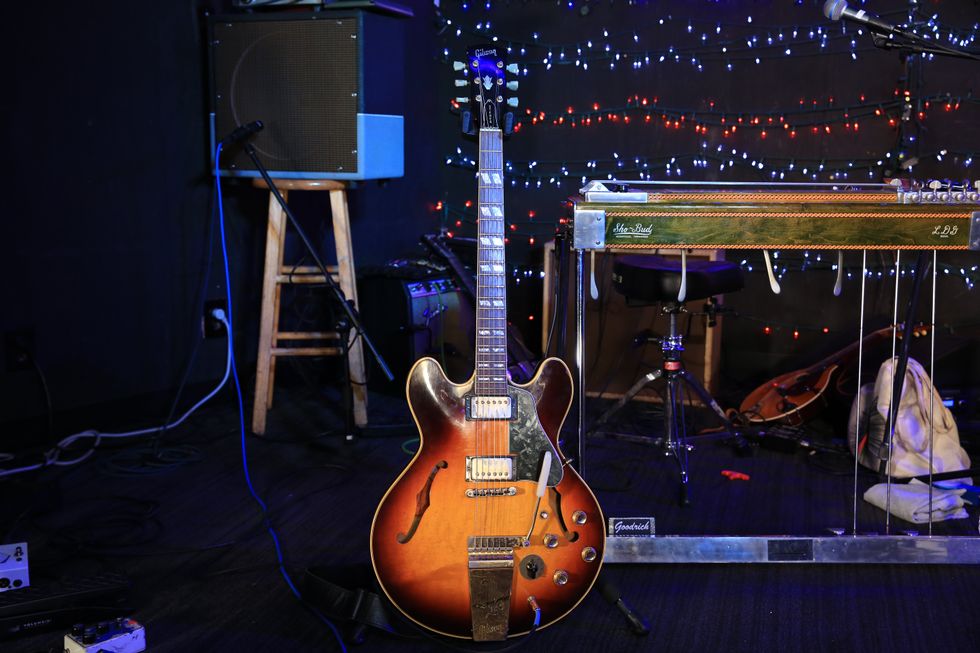
Pollock bought this 1967 Gibson ES-345 at Carter Vintage Guitars in Nashville, and since then, it has been his closest friend, used on all tours and recordings. He favors its out-of-phase sounds brought on by using both pickups, and though it's equipped with a Varitone knob system, Pollock almost never uses it. He hasn’t changed the strings in years.
The Kustomer is Always Right
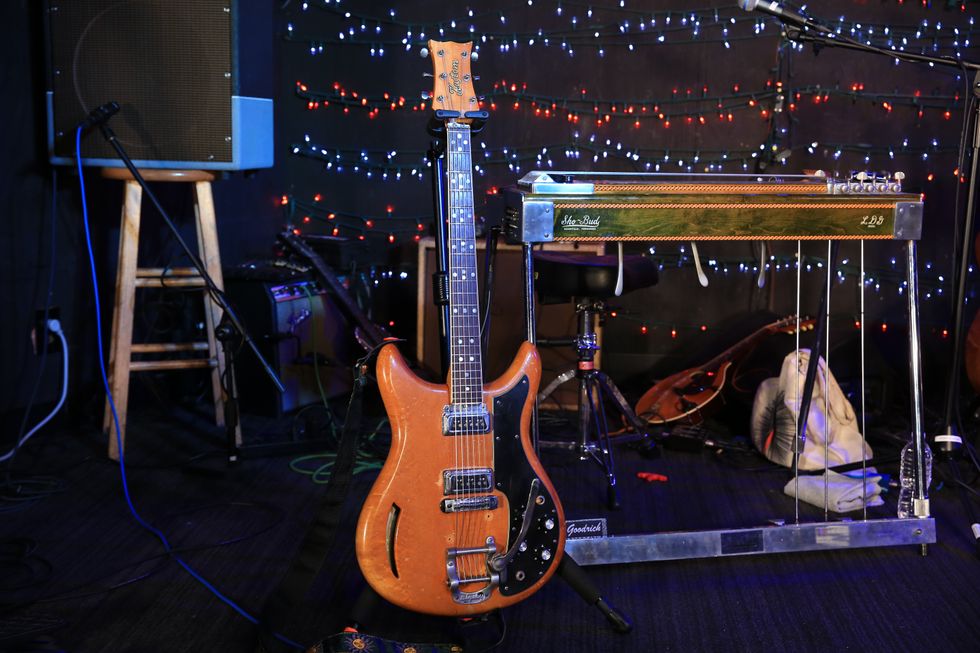
It was almost closing time when Pollock saw this Kustom K-200 hanging on a wall in a New York City guitar shop. The shop clerk said there was no time to try it, so Pollock bought it on the spot. It has a darker tone than his 345, which he brightens with a wah pedal. Its strings haven’t been changed since he bought it.
A Fender Mustang, bought in 2016, was treated to new strings recently by Pollock’s tech. He didn’t seem stoked.
Projector Project
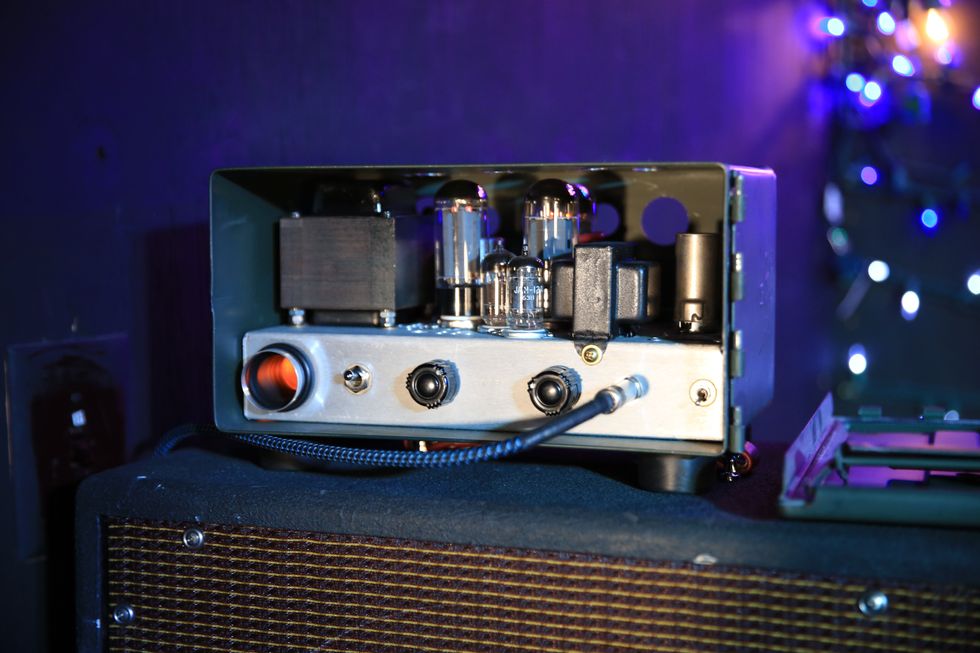
With his black-panel Fender Deluxe already making its way to Red Rocks, Pollock opted for this Austen Hooks-built projector amp. Hooks built him one after Pollock fell in love with another of his builds at a Los Angeles studio.
Rubin Pollock’s Pedalboard
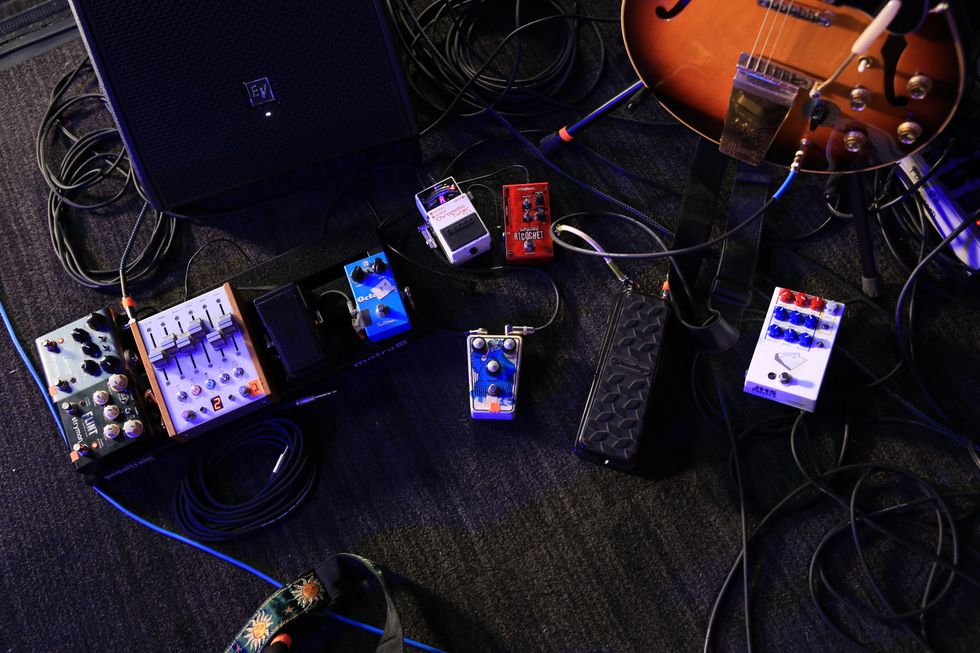
Pollock packs light, configuring his board to fit in a shoulder bag that he can carry himself wherever he needs to go. His pedals include a Strymon El Capistan and Flint, JHS Colour Box, DigiTech Whammy Ricochet, Boss TU-3, Fulltone Octafuzz, Chase Bliss Preamp Mark II, and an Isle of Tone “Cookie Monster” fuzz.
Jökull Júlíusson’s Guitars
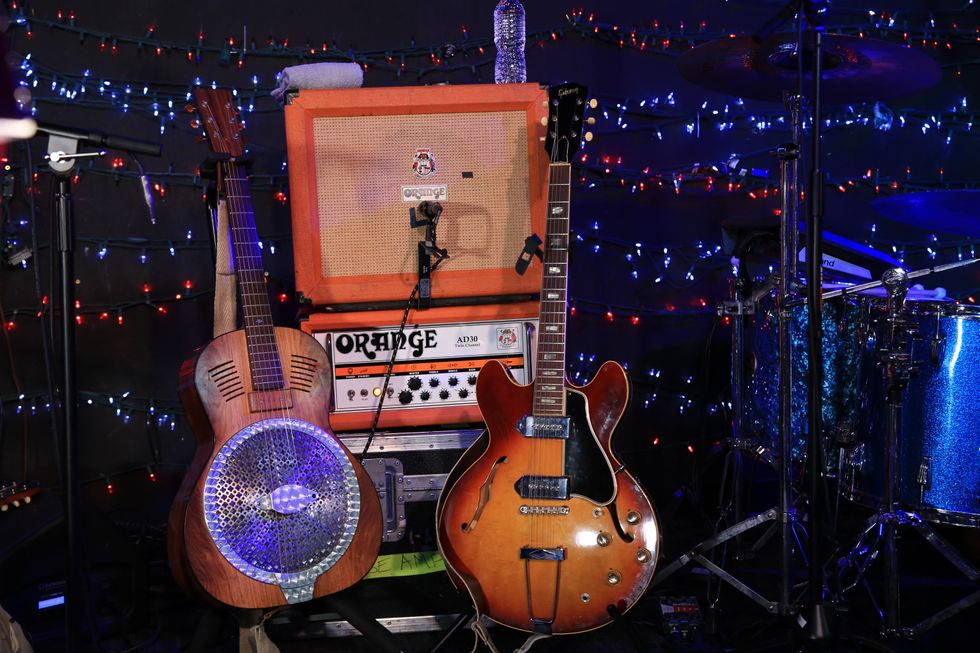
Jökull “J.J.” Júlíusson couldn’t make it for the Rundown, but Pollock gave us a look at his Gibson ES-330 and his signature resonator, built by English luthier Pete Turner. Behind them sits J.J.’s long-time go-to amp, his Orange AD30, which ran through an Orange 1x12 cab.
Jökull Júlíusson’s Board
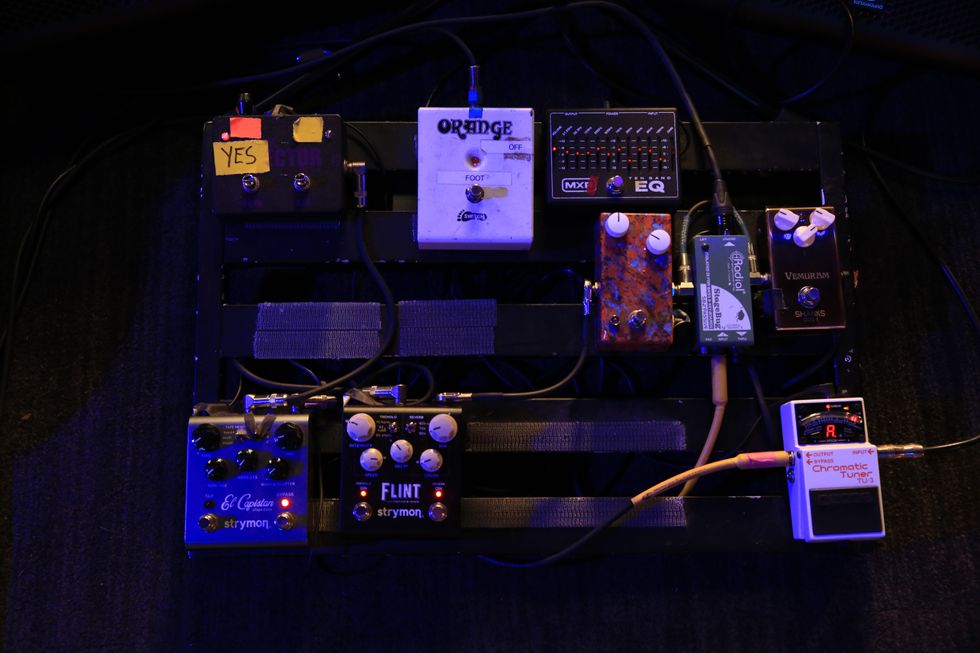
Júlíusson’s board includes a Strymon Flint and El Capistan, Boss TU-3, a custom Sounds of Shelby drive pedal, Vemuram Shanks ODS-1, MXR Ten Band EQ, and Radial StageBug DI box, plus a channel switcher for the AD30.

“Someone sent me a picture and was like, ‘Isn’t this your guitar?’” That time Diamond Rowe saw her signature guitar on stage with one of her biggest influences
“There is no magical increase in sales from patriotic Americans willing to rescue us” – how Trump’s tariffs are stretching US amp and pedal companies to breaking point
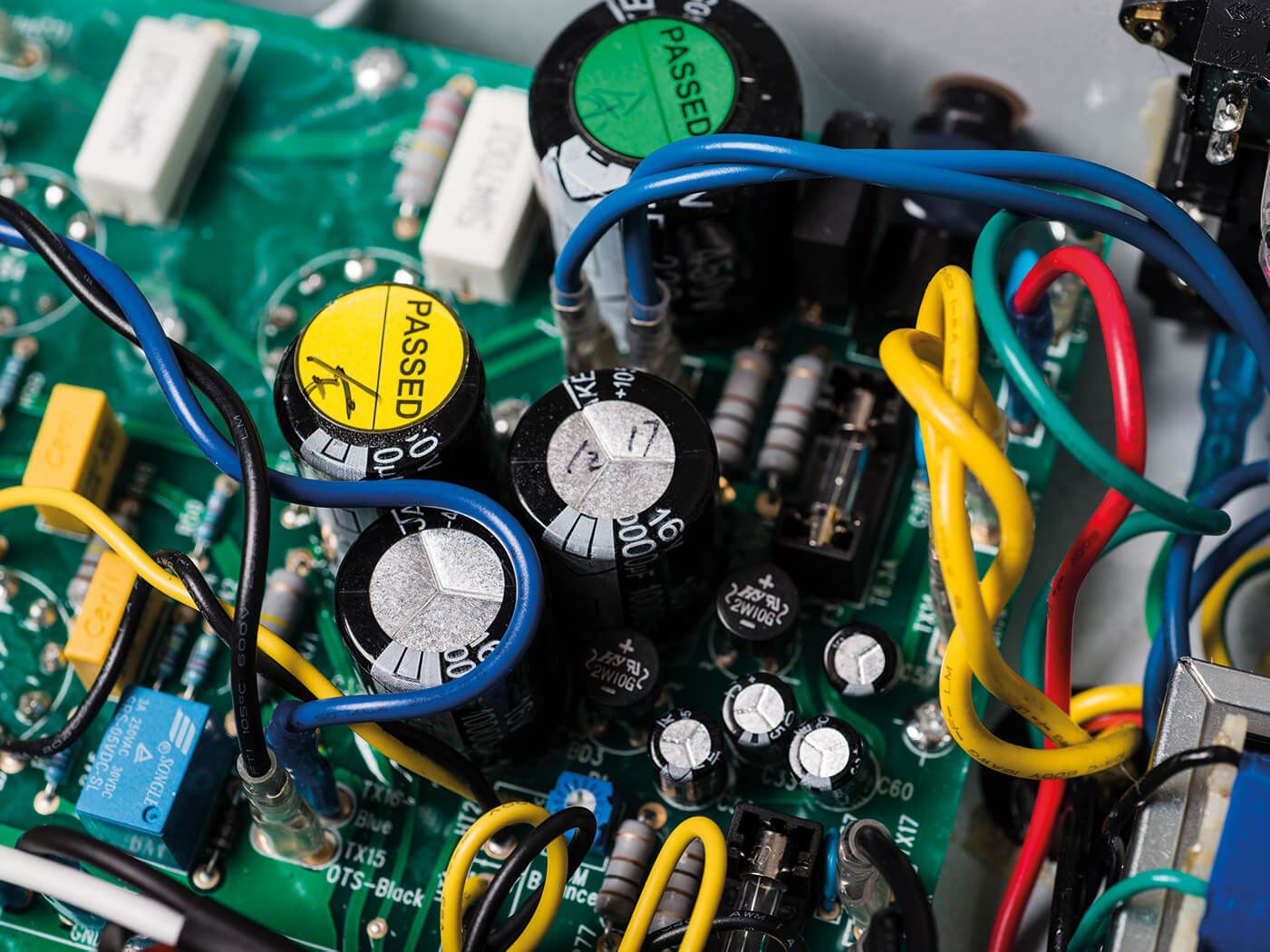
As pedal makers told us last week, the tariffs that have been implemented by the current US administration are posing a real existential threat to the US boutique pedal industry. These choices seem to ignore the reality of the global supply chain many industries rely on, and as a result many of your favourite pedal brands are considering layoffs and closure thanks to spiralling costs and tanking sales.
Since the potential fallout of the tariffs became clear, EarthQuaker Devices CEO Julie Robbins has been raising awareness about how destructive they could be, and has also rallied a support group of concerned builders, in the absence of any official guidance.
With her help we’ve surveyed major figures from over 30 pedal, amp, guitar and pickup brands. Last week we explored how all of these figures reported negative impacts of the tariffs, from tanking sales to spiralling costs, and logistical nightmares thanks to the rapidly-fluctuating rates. This week I want to dive further into some figures to put their anxiety into a firmer context.
The cost of the tariffs
We’ve already given one direct example of a price that’s increased – JHS’ Footswitches went from around $1.10 each to around $3 per switch at their peak. Given that JHS uses around 100,000 footswitches a year, that’s potentially an extra $200,000 annually for just that single part.
Let’s put some more numbers on things. Mission Engineering’s James Lebihan gives us the example of a PCB order, which went from $199.06 PCB in March of this year to a $314.91 order in May. That’s a pretty sizable increase by itself – however, it’s pennies compared to sourcing the same part domestically: Lebihan says Mission was quoted $9,000 for an equivalent part from a US supplier.
A few more examples: Jon Cusack of Cusack Music gives an example of a parts order that cost $5,400. The tariff charge for it was an almost 200% addition of $10,500 for a total of $15,900. Similarly, Robert Keeley reports a circuit board order for $2,000 that received a 180% tariff of $3,600. Summer School Electronics’ Mark Turley gives us an example of a parts order that went from $2,577 to $3,877. Mr Black Pedals’ Jack Deville told us of a standard footswitch that went up by $3, from $2.35 to $5.35 – and that’s a per-pedal cost increase for just a single part.
At time of writing, the tariff rate has come down since these more extreme examples were given, and are roughly 30%. This is about how much more expensive Robbins has told us EarthQuaker’s PCBs have become since March, and similar to Mission’s issues, sourcing PCBs domestically just isn’t viable.
“The quality [of US-made PCBs] is not as high, and the cost is nearly 15 to 25 times what we are currently paying,” Robbins says. “That would raise the retail price on all of our products well above a competitive range anyone would be willing to pay.”
A rock and a hard place
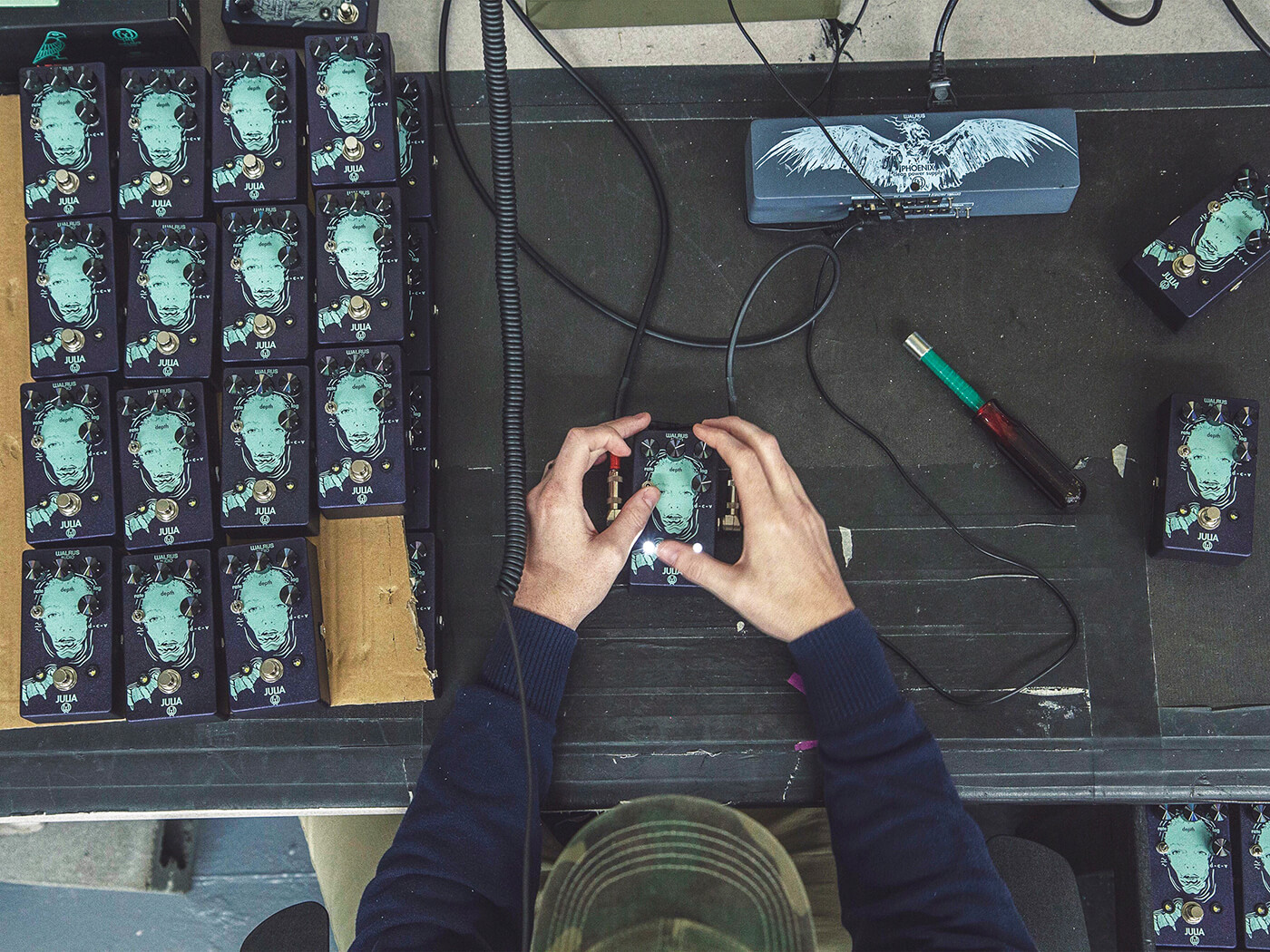
Even avoiding the drastic price increases that come from domestic sourcing, an increase of 30% per PCB thanks to tariffs is a significant cut into a product’s profit margin. Smaller companies with slimmer margins cannot really afford to just eat these extra costs – nor are prices of pedals flexible enough to bear price increases without seeing sales drops. There’s already an idea of what a US-made ‘boutique’ pedal in a given niche should cost, and below the likes of the $500+ workstation reverbs, these price brackets are pretty firmly-defined.
EarthQuaker’s Julie Robbins gives us the example of the FlexiLoops pedal. Launched 2024 at $129, its price includes a 15% net profit for EarthQuaker. “With the tariffs, we would need to raise the price to $159 in order to maintain a profit margin. This would overprice this product for its function.” Julie’s point is that $129 is pretty affordable compared to the rest of the EQD lineup – but the FlexiLoops is ultimately a loop-switcher. The tariffs could push this utility pedal up to the kind of price people are used to paying for fully-featured effects pedals.
These makers are also acutely aware of the wider economy at the moment – people are being squeezed on the cost of everyday items across the board, leaving everyone with less disposable income. If boutique pedal makers were to increase their prices significantly to cover the tariff costs, many of them feared that this would lead to a drastic sales drop – which could lead to layoffs or outright closure.
And this is on top of the fact that many have already seen sales collapse since the tariffs came in. Export sales in particular have fallen the worst for many companies – one maker even lost a European dealer who didn’t want to risk products getting caught up in an escalating trade war.
EveAnna Manley of Manley Laboratories described the impact of the tariffs being coupled with an “anti-American poisoning of the customer sentiment in other countries,” thanks to the measures themselves and the confrontational tone with which they’ve been implemented. “The destruction of our heretofore healthy export business is much more of a problem than increased tariffs on incoming parts for my particular company,” she says, adding that “there is no magical 100% increase in domestic sales relief coming from patriotic Americans willing to rescue us boutique, made-in-USA companies, either.”
The future
We asked brands what the impact of the tariffs might be in the next six to 12 months if things don’t change. The outlooks they set out here are universally negative, with many emphasising the inevitable outcome of falling sales from increased prices – leading to anything from fully outsourcing manufacturing, mass layoffs and closure – a number of companies’ answers here are simply ‘failure’ or ‘closure’.
JHS’s Josh Scott tells us that “prices will rise, sales will drop due to that – and we may be facing mass layoffs by 2026 in a worst case scenario.” Robert Keeley similarly states that “the current tariff level will zero out my chance for a profitable year. A 55% tariff on half of my cost going into producing a product is not sustainable.”
Mission Engineering’s James Lebihan states: “We have frozen hiring and expansion plans. We are looking into outsourcing our product assembly. If the situation does not improve we will begin laying off US staff and look to relocate to a small factory or shut down our manufacturing completely and outsource everything. It’s possible we may not be able to continue and the business may close completely.”
Jon Cusack writes of the unique challenges that his company faces thanks to Cusack Music’s business model. “Since I manufacture for many other brands in the industry, I fear that this may force some of them into outsourcing their entire builds to China… we could lose between five and perhaps all 30 of my employees if it gets bad enough.”
One other potential impact that Death By Audio’s Oliver Ackermann raises is a shift away from the experimental pedals to focus on the mass-appeal stuff with guaranteed sales. This is one of those more intangible things that still ultimately undermines the industry, given that up until now, the US boutique pedal market has been one that allowed fiercely creative and experimental products to find a niche.
Phone home
Electronics are, of course, one of the central issues of the tariff debate – so amp and pedal companies are going to be locked into this fight no matter what. Trump’s attention is focused on threatening the larger smartphone makers and trying to prove that a USA-made phone is totally possible, and so even if guitar-makers avoid the full force of the tariffs on wood imports, the electronic components that are 90% of a pedal’s bill of materials are going to remain in the crossfire.
Last week we explored how the tariffs are ostensibly trying to bolster a domestic electronics industry that does not exist. The furore about the Trump Phone has become the most high-profile facet of this – with experts casting huge doubts on the claim that an entirely US-made phone is going to be launched in August for $499.
The global supply chain has been an essential cog of American manufacturing and commerce for decades now. Even the President himself leverages it for his own business interests – be that red hats, Trump Guitars or indeed a phone.
As we’ve discussed, there simply aren’t viable sources of US-made resistors or capacitors in 2025. Even the biggest companies in the world cannot just create a US electronics industry out of whole cloth. Apple cannot instantly magic a component factory out of the ground in Ohio – and the tariffs are in force and strangling small businesses in America right now. Without some sort of exemption, what hope is there for this industry in the short to medium term, even if every resource is moved in the next few years to make all-American electronics possible someday?
Until this nebulous and entirely speculative future comes to pass, sales are down, costs are up, the future is uncertain. What viable paths out from this situation are there? Makers are trapped between these ever-increasing costs, decreasing margins and the impossibility of domestic sourcing.
Tooling up to make the parts needed, according to multiple makers that we surveyed, comes with an estimated cost ranging from hundreds of millions of dollars to several billion and a time scale of, at the very least, five years, but most likely more.
Will the American pedal industry exist by then? We all hope so, but the situation is looking increasingly dire.
The post “There is no magical increase in sales from patriotic Americans willing to rescue us” – how Trump’s tariffs are stretching US amp and pedal companies to breaking point appeared first on Guitar.com | All Things Guitar.
Gibson wants to start selling artist-owned vintage guitars to get them “back out into the world to be played and enjoyed forever”

Gibson may well be teaming up with artists in the future to release their vintage guitars through its Certified Vintage programme.
This is according to Gibson’s Certified Vintage Manager, Mitch Conrad, who thinks doing so could be a great opportunity to release rare, vintage gems back out into the world to be played and enjoyed. Plus, artists who have amassed a rather large collection and may want to let a few things go can be assured their instruments are being handled with care.
Speaking to the Gibson Gazette regarding an incredibly rare 1959 Flying V, which is one of just 17, Conrad says the programme helps to provide “peace of mind and clarity” among the world of vintage guitars, “which can be a murky place”.
He says, “This is a situation where we’re able to provide an opportunity for someone to purchase one of the rarest and most collectable instruments – one of 17 made in 1959 – with complete confidence that it is exactly what we’re saying it is.
“This also gives people a chance to be close to something, see something, and be inspired by something that most people won’t get the opportunity to see. Maybe there’s an eight-year-old kid who walks through the Gibson Garage and sees this Flying V behind the glass case, and their eyes just light up. Maybe that kid goes home with an Epiphone Flying V. That might be the person in 40 years who has worked hard, made great money, and now they are the preservationist with the opportunity to buy this guitar and be its next custodian.”
Asked if Certified Vintage artist collabs could become a thing in the future, Conrad states, “I would love to be able to work with artists who have already built up beautiful collections of instruments and are ready to let a few things go, and be able to have those collaborative releases through Certified Vintage.
“I think that would be a really, really great opportunity… I think there’s space for Gibson Certified Vintage to be something that, as a company, allows us to learn more about ourselves and our history, implementing the information we learn from these guitars in the pursuit of even greater historical accuracy and expanding that to Gibson USA and Epiphone. But then also being able to push that out further into working with artists collaboratively, and giving these guitars back out into the world to be played and enjoyed forever.”
You can find out more about the Certified Vintage programme via the official Gibson website.
The post Gibson wants to start selling artist-owned vintage guitars to get them “back out into the world to be played and enjoyed forever” appeared first on Guitar.com | All Things Guitar.
“The last time I saw one for sale on Ebay, somebody wanted $300 for it”: Session ace Justin Ostrander on the sought-after pill bottle slide used by Duane Allman and Derek Trucks – and how he got one for free
He played a guitar held together by a belt, was admired by Keith Richards, covered by Springsteen and described by Bert Jansch as “the most underrated guitarist ever” – the life and times of a beatnik folk pioneer
“Built to make tuning faster, more precise, and effortless”: Band Industries’ Roadie 4 – a noise-immune automatic tuner – builds on its acclaimed predecessor, with some key upgrades
“This is for the guys that think they know everything about the clone, yet they just want to have a little bit more”: Keeley Electronics adds more compression, suppression, bass, and headroom to the Klon Centaur recipe
A Dylan Role for His Guitars Is Just the Latest Chapter in Lark Street Music Owner Buzzy Levine’s Vintage Saga
“When I picked up the Fender, it immediately responded to what I was putting into it. So I went out and bought a Tele and a Strat on the same day”: Fender's highly sought-after Richie Kotzen signature Stratocaster has just been rolled out worldwide
“I used to ask, ‘What was Hendrix really like?’ All Noel would say was, ‘He was a black blues player who took a lot of acid’”: Eric Bell tells the tale of how he joined forces with Noel Redding, after leaving Thin Lizzy as a self-confessed ‘basket-case’
What kind of maniac brings a Dumble to a guitar retreat – and lets everyone play it? Robben Ford, apparently

What would you do if you were one of the few lucky souls in the world who owned a Dumble amp? Probably not take it to a guitar retreat and let a bunch of strangers plug into it.
Though that’s exactly what Robben Ford did, as session ace Andy Wood reveals in a recent conversation with Rick Beato.
In their chat, Wood recalls the time Ford attended his Woodshed Guitar Experience: a four-day retreat in Crossville, Tennessee that brings together top-tier players and gear-loving guitarists for an immersive, no-frills hangout.
“It’s a four-day weekend. We hard-limit it to a hundred people, and we bring in five or six of the best guitar players on earth,” says Wood [via Guitar World]. Previous guests have included Eric Johnson, Joe Bonamassa, and Andy Timmons, with Paul Gilbert and Mark Lettieri on the upcoming September lineup.
The vibe is intentionally relaxed. Think: late-night jams by the lake and live bands instead of backing tracks (“no iPad garbage,” Wood quips). Just “bad dudes from Tennessee” and 100-watt amps roaring into the night.
Still, nothing quite prepared Wood for what happened in the retreat’s second year, when Robben Ford rolled in.
“He’s a sweetheart and a monster player,” says Wood. “He comes in and I was like, ‘Hey, Robben, what kind of amp do you want me to have backline for you?’ And he goes, ‘I’ll bring an amp.’ He shows up with Dumble #102.”
For the uninitiated, Ford’s Dumble #102 isn’t just rare – it’s the stuff of tone legend. Built by the late Alexander “Howard” Dumble, these mythical tube amps were revered for their rich harmonic character and tight dynamic response. Ford’s own unit ranks among the most iconic, alongside those played by Larry Carlton and Stevie Ray Vaughan.
That said, what truly made the moment unforgettable wasn’t the amp itself but rather, Ford’s willingness to share it.
“I’m teaching a class and I have my phone in my pocket and it buzzes like, ‘Hey man, Andy, come down to the stage three and see about Robben’s amp,’” he recalls. “I was like, ‘Oh, somebody poured a beer in it!’ I’m stressing out.”
“I get down there, and Robben’s sitting laidback, chill, smiling, and the campers are playing his amp. And I come over to him like, ‘Brother, you don’t have to do this.’ And he’s so sweet. He’s like, ‘No, man. They were all asking about what it felt like, and what it sounded like, so I figured it’d be best to let them play.’”
“That can never happen with 600 people,” Wood continues. “[But] you put 30 people in a room, that can happen. And that’s what it’s all about.”
The post What kind of maniac brings a Dumble to a guitar retreat – and lets everyone play it? Robben Ford, apparently appeared first on Guitar.com | All Things Guitar.
“F**k ICE” guitar pedal launched by Resistor Head to raise funds for immigrant legal aid

Boutique pedal maker Resistor Head has never exactly played it safe when it comes to design, but their new limited-edition drop is as loud politically as it is sonically.
Meet the FUCK ICE overdrive pedal, a fully functional stompbox that doubles as a middle finger to the US Immigration and Customs Enforcement.
The release was announced in an Instagram post this week, and the pedal is now available for pre-order via the company’s website. While the guts of the unit are identical to Resistor Head’s existing ACAB pedal (no points for guessing that acronym), this version arrives with new graphics and a clear message.
Priced at $150, or $5 more than the original ACAB, the difference in cost goes to the National Immigrant Justice Center, an organisation that provides immigrants with vital legal assistance.
“That $5 will be donated… to provide immigrants with legal help,” says the brand.
As with the ACAB pedal, FUCK ICE is a clone of the Fulltone OCD, minus the association with Fulltone founder Mike Fuller, who’s been widely criticised for his public comments online. In the words of Resistor Head: “It’s a Fulltone OCD clone, offered for people who don’t want to support Mike Fuller of Fulltone for any of his documented offenses.”
The design blends elements of various OCD iterations (particularly versions 1.4 and 1.7), with some modern upgrades. Those include an internally bypassable output buffer with a trim pot to dial back the high end frequencies to deliver a warmer sound, if desired.
“The original Fulltone OCDs had output impedance issues that caused the tone of the pedal and output volume to change depending on the input impedance of the next activated pedal in the chain. My update eliminates this issue but still enables you to dial in the warmth that buffers can remove,” says the firm.
Visually, the pedal features professionally UV-printed graphics, topped off with a glossy, raised finish for a premium feel – in case you want a pedal that screams “FUCK ICE” in big bold letters to also look sharp on your board.
Learn more at Resistor Head.
The post “F**k ICE” guitar pedal launched by Resistor Head to raise funds for immigrant legal aid appeared first on Guitar.com | All Things Guitar.
guitarguitar is welcoming applications from those made redundant from PMT

UK music retailer guitarguitar says it is welcoming applications from employees who have been made redundant from PMT, following the chain’s entry into administration last week.
In a new post on social media, the retailer writes: “We were saddened to hear about the recent job losses at PMT. At guitarguitar, we understand how challenging redundancy can be, and we want to offer our support to the hardworking staff affected.”
- READ MORE: “Clone me, you bastards!”: Iced tea with Ozzy Osbourne’s actual DNA now for sale at $450 a pop
It goes on: “If you have recently been made redundant from PMT are are passionate about music, retail or customer service, we encourage you to apply for opportunities with guitarguitar.”
It explains that those affected by redundancy should send an application “whether we have an open role which currently matches your skills and experience or not”.
The retailer says prospective employees should visit the vacancies page on its website, or email a CV to jobs@guitarguitar.co.uk.
“Join our team of employee-owners and continue to share your passion for music,” the statement concludes.
The closure of PMT was a significant loss for the UK music retail industry, as it was the largest brick-and-mortar musical instrument chain in the UK with 11 stores, as well as the fourth largest in terms of revenue. PMT explained that the current retail climate presented challenges that “proved too difficult to overcome”.
The announcement of PMT’s entry into administration was sudden, and all of its stores were closed with immediate effect, with 96 employees being made redundant. 48 people were retained to assist administrators. The retailer’s remaining stock was sold to another UK-based musical instrument operation, Gear4music, to the tune of around £2.4 million.
In the wake of the news, which follows the similar recent closures of GAK and Bax Music, YouTuber KDH offered his opinion that UK musical instrument retail was “heading towards a monopoly”.
“Small retailers close down, and now even the bigger retailers close down because they can’t compete with online prices, well, what’s gonna happen?” He asks. “You’re gonna be left with one or two who might have started out cheap, but then when there’s no competition, raise the prices up.”
The post guitarguitar is welcoming applications from those made redundant from PMT appeared first on Guitar.com | All Things Guitar.
“We were all ready to become millionaires after a couple of years... He was great at that age. I couldn’t believe it”: How Gary Moore came to join Skid Row at just 15 years old – and why the guitar legend left
“They understood the sentimentality of these instruments and worked incredibly hard to bring them home”: Heart's stolen instruments have been recovered by the police – with a little help from the public
I've just found the best streaming deal of the summer – get up to 4 free months of Amazon Music Unlimited right now
“Clone me, you bastards!”: Iced tea with Ozzy Osbourne’s actual DNA now for sale at $450 a pop

The Ozzy Osbourne merch machine has entered a truly bizarre phase. Hot on the heels of his upcoming Where’s Ozzy? seek-and-find book, the Black Sabbath icon is now offering fans the chance to own cans of iced tea infused with his actual DNA.
That’s right. In collaboration with canned water brand Liquid Death, Osbourne has unveiled a limited edition run of ten cans dubbed “Infinite Ozzy”. Each one has reportedly been sipped and lovingly contaminated by the Prince of Darkness, before being lab-sealed and signed for good measure.
The price? A modest $450 per can, because nothing says rock ‘n’ roll like highly collectible, semi-hydrated human essence.
“Clone me, you bastards,” Osbourne commands in a statement. And apparently, that’s more than just a punchline.
“Yes, we really got the Prince of Darkness to drink from 10 cans of our low-calorie Iced Tea,” Liquid Death confirms. “And yes, he actually crushed each can himself. In the process, he left behind trace DNA from his saliva that you can now own. He even hand-signed each packaging label.”
The company also declares that “once technology and federal law permit, fans can use this DNA to try to clone Ozzy in the future and enjoy him for hundreds of years to come.”
The release is, of course, timed perfectly – just ahead of Ozzy’s final show with Black Sabbath, which takes place 5 July in Birmingham, England. Whether you drink it, frame it, or cryogenically store it in your garage lab, one thing’s clear: rock memorabilia may never get weirder than this.
Learn more at Liquid Death.
The post “Clone me, you bastards!”: Iced tea with Ozzy Osbourne’s actual DNA now for sale at $450 a pop appeared first on Guitar.com | All Things Guitar.
Could you be the next Paul McCartney? The Bootleg Beatles need a new bassist

Do you play bass? Can you rock a bowl cut and nail every note of Come Together? Well, you may want to audition to be the next Paul McCartney for the popular tribute band, The Bootleg Beatles.
Having formed back in 1980, the tribute to the Fab Four have played over 4,500 gigs, and are due to play at Glastonbury festival this June. They’ve even formerly supported Oasis, notably during their famous Knebworth show on 10 August 1996.
The band consists of Stephen Hill as George Harrison, Gordon Elsmore as Ringo Starr, and Paul Canning as John Lennon. Steve White, who has played as McCartney for over 10 years, is due to retire later this year.
On Instagram, they write, “We’re very sad to announce that Steve White, our fab Macca for over 10 years, is retiring from full-time touring with BB’s this autumn. He has been an outstanding contributor to this wonderful BB ‘institution’ and we all wish him well with his future musical projects.”
If you manage to land the role, you’ll be touring with the band from autumn. Anyone with the right skills can apply, but you must have “the look, the voice, bass guitar and keyboard skills”. You’ll also need to be prepared to commit to full-time touring.
In other Macca news, he recently joined Bruce Springsteen at his Liverpool show on 7 June to play The Beatles’ Can’t Buy Me Love. The appearance marked the first time that McCartney has played live in Liverpool since 2018.
If you’d like to apply to The Bootleg Beatles, you’ll need to send a CV, photos, and video/audio clips to auditions@bootlegbeatles.com – you can also find out more about the band via their official website.
The post Could you be the next Paul McCartney? The Bootleg Beatles need a new bassist appeared first on Guitar.com | All Things Guitar.
Marcus King and Gibson reunite on a stripped-back ES-345 in Sixties Cherry

Blues-rock guitarist and singer-songwriter Marcus King has teamed up with Gibson on his second signature guitar, the Marcus King ES-345 Sixties Cherry.
Inspired by his treasured 1962 ES-345, affectionately known as Big Red, this latest model is a tribute to the iconic six-string passed down through three generations of King’s family.
Originally introduced as a Custom Shop-only release in 2021, the new ES-345 now joins Gibson’s core Artist model lineup in a streamlined version that reflects King’s personal playing preferences.
Finished in a bold Sixties Cherry, the guitar keeps things simple and focused. Notably absent are a whammy bar and Varitone switch – features found on the original – which were deliberately omitted in favour of “only the features that Marcus finds essential”.
That includes mono wiring, two Custombucker humbuckers, and a fixed Vibrola tailpiece to enhance tuning stability while maintaining the vintage aesthetic. Other classic ES-345 appointments remain, such as the 3-ply maple/poplar/maple body, a solid maple center block for sustain and feedback resistance, and gold hardware throughout – including an ABR-1 Tune-O-Matic bridge and Grover Rotomatic tuners with kidney buttons.
 Credit: Gibson
Credit: Gibson
The guitar’s mahogany neck features a rounded profile that averages .875” at the first fret and .975” at the 12th fret, while its Indian rosewood fretboard features acrylic split parallelogram inlays and 22 medium jumbo frets.
A Graph Tech nut and a custom stud anchor cover round out the build. Each guitar also comes shipped in a Gibson hardshell case.
For King, the connection to this model is deeply personal: “The guitar for me as a kid was a release, an escape, a best friend, and a babysitter,” he tells Gibson. “I don’t really like talking about myself, but it being my grandfather’s guitar really helps me feel like I’m able to carry on his legacy. I want to share with everyone else what he shared with me.”
The Gibson Marcus King ES-345 Sixties Cherry is now available for $9,499.
Learn more at Gibson.
The post Marcus King and Gibson reunite on a stripped-back ES-345 in Sixties Cherry appeared first on Guitar.com | All Things Guitar.

